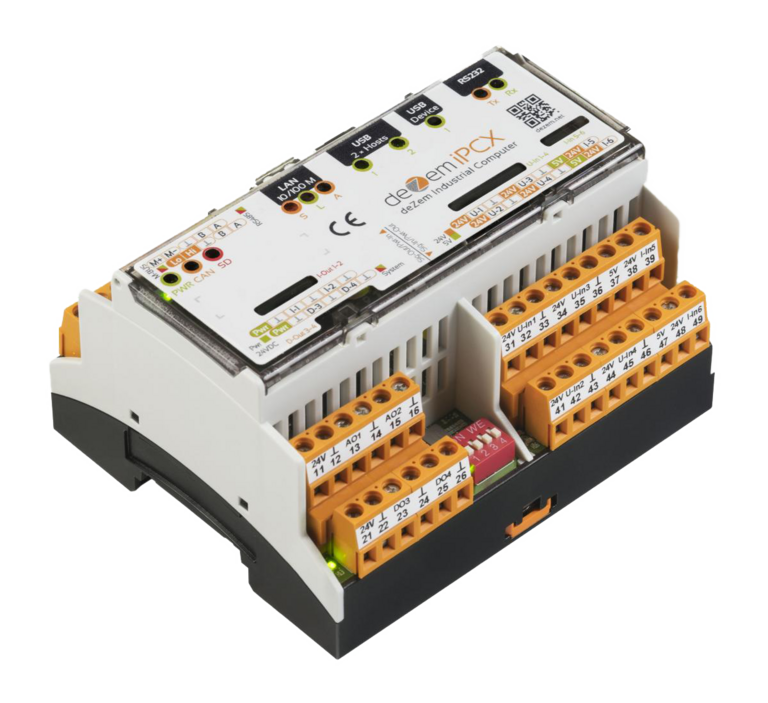Flexible data acquisition
The data logger iPCX speaks most of the common standardised data protocols and field buses. Measurements relating to electricity, gas, water, heat, etc. are easily connected. Same for operation and production data of all kind. At least 1000 running measurements from widely dispersed sensors, meters, automation stations etc. can be monitored simultaneously - via 2-wire field bus, wireless or via network. Metered values are bundled and transferred in real time to a data platform of your choice. Our security architecture for data transfer consistently receives top marks from the IT executives of customers.
The iPCX is a compact, powerful all-rounder. Despite its extensive functionality it is easy to use and configure via HTML interfaces. The hardware basis is a robust, fanless industrial PC based on Linux with large data memory.
Why the deZem iPCX?
- Connection of sensors, meters, metering devices and other data sources via various field buses and interfaces
- Read out hundreds of data sources with one iPCX
- Local buffering of at least 3 million metered values in a ring buffer
- Reliable, redundant real-time transmission of metered values via Ethernet or mobile communications
- Data transmission via HTTPS, CSV-structured
- Two freely configurable destination addresses (e.g. Intranet and Internet)
- Integrated web server with access-protected configuration interface
- Optionally remote configuration and remote update
- Time resolution of metered values up to 1 s
- Efficient, event-based reading of electrical metered variables with a ZMx Multi-Meter device
- Convenient configuration via scan and template functions
Case example: Energy management
Many customers use the iPCX to collect energy data. Benefits go far beyond the ISO 50001 / ISO 50006 audit. The aim is to easily and efficiently monitor meters, installations and relevant variables; in other words, everything that affects energy efficiency and energy-related performance:
- Electricity, water, gas, heat, temperatures, quantities - the iPCX collects any time-based data, checks for plausibility, stores and transmits it to a data platform.
- Heterogeneous, grown structures with different protocols and gateways are simply connected to the iPCX.
- New plants, changes to existing facilities? Many systems require long planning and extensive support from customer service. With the iPCX, changes to the technical infrastructure are integrated quickly and easily, and the energy data is always up-to-date.
- Establishing complex energy data collection from scratch? With iPCX, it is done in a few weeks.
- Compact form and straightforward configuration: the iPCX is particularly easy to use.
- Recurring configurations can be created on one iPCX and then transferred to many more.
Hardware-based interfaces
User-friendly connectivity
- 1x RJ45 Ethernet
- 1x RS485
- 1x RS232 via RJ45
- 1x M-Bus (incl. level converter for 60 standard loads)
- 1x CAN bus
- 2x USB device/ 1x host
- 4x voltage inputs 0 - 10 V dc (also for pulses)
- 2x current inputs 4 - 20 mA
- 2x digital outputs
- 2x analogue outputs 0 - 20 mA
- 6x Power Out 24 V dc
- 2x Power Out 5 V dc
Software-based interfaces
iPCX - the linguist
- M-Bus with integrated level converter (max. 60 standard loads); compatible with all meter types, manufacturers, models etc.; scan for automatic detection of all M-Bus meters on the connected bus segments.
- wM-Bus (wireless M-Bus) according to Open Metering Standard (OMS), supports S- and T-Mode; scan for automatic detection of wM-Bus meters.
- Modbus master for Modbus / RTU networks and Modbus TCP-enabled devices; template function for fast creation and configuration of devices.
- 1-Wire Bus Master for integration of all common 1-Wire sensors (temperatures, humidity, analog signals etc.); scan for automatic detection of devices and sensors.
- BACnet Client (BACnet-2010, Rev. 12) with extensive scan and configuration options for BACnet/IP for automatic detection and readout of all BACnet-enabled devices in the network with their objects and properties.
- Profibus, KNX, EnOcean and much more via gateways
- Special interfaces (custome made) for GLTs, PLCs, weather stations etc.


